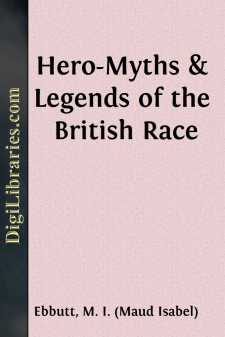Categories
- Antiques & Collectibles 13
- Architecture 36
- Art 48
- Bibles 22
- Biography & Autobiography 813
- Body, Mind & Spirit 142
- Business & Economics 28
- Children's Books 14
- Children's Fiction 11
- Computers 4
- Cooking 94
- Crafts & Hobbies 4
- Drama 346
- Education 46
- Family & Relationships 57
- Fiction 11829
- Games 19
- Gardening 17
- Health & Fitness 34
- History 1377
- House & Home 1
- Humor 147
- Juvenile Fiction 1873
- Juvenile Nonfiction 202
- Language Arts & Disciplines 88
- Law 16
- Literary Collections 686
- Literary Criticism 179
- Mathematics 13
- Medical 41
- Music 40
- Nature 179
- Non-Classifiable 1768
- Performing Arts 7
- Periodicals 1453
- Philosophy 64
- Photography 2
- Poetry 896
- Political Science 203
- Psychology 42
- Reference 154
- Religion 513
- Science 126
- Self-Help 84
- Social Science 81
- Sports & Recreation 34
- Study Aids 3
- Technology & Engineering 59
- Transportation 23
- Travel 463
- True Crime 29
Hero-Myths & Legends of the British Race
Categories:
Description:
Excerpt
INTRODUCTION
THE writer who would tell again for people of the twentieth century the legends and stories that delighted the folk of the thirteenth and fourteenth centuries finds himself confronted with a vast mass of material ready to his hand. Unless he exercises a wise discrimination and has some system of selection, he becomes lost in the mazes of as enchanted a land,
“Where Truth and Dream walk hand in hand,”as ever bewildered knights of old in days of romance. Down all the dimly lighted pathways of mediæval literature mystical figures beckon him in every direction; fairies, goblins, witches, knights and ladies and giants entice him, and unless, like Theseus of old, he follows closely his guiding clue, he will find that he reaches no goal, attains to no clear vision, achieves no quest. He will remain spell-bound, captivated by the Middle Ages—
“The life, the delight, and the sorrowOf troublous and chivalrous years
That knew not of night nor of morrow,
Of hopes or of fears.
The wars and the woes and the glories
That quicken, and lighten, and rain
From the clouds of its chronicled stories
The passion, the pride, and the pain.”
Such a golden clue to guide the modern seeker through the labyrinths of the mediæval mind is that which I have tried to suggest in the title “Hero-Myths and Legends of the British Race”—the pursuit and representation of the ideal hero as the mind of Britain and of early and mediæval England imagined him, together with the study of the characteristics which made this or that particular person, mythical or legendary, a hero to the century which sang or wrote about him. The interest goes deeper when we study, not merely
“Old heroes who could grandly doAs they could greatly dare,”
but
“Heroes of our island breedAnd men and women of our British birth.”
“Hero-worship endures for ever while man endures,” wrote Thomas Carlyle, and this fidelity of men to their admiration for great heroes is one of the surest tokens by which we can judge of their own character. Such as the hero is, such will his worshippers be; and the men who idolised Robin Hood will be found to have been men who were themselves in revolt against oppressive law, or who, finding law powerless to prevent tyranny, glorified the lawless punishment of wrongs and the bold denunciation of perverted justice. The warriors who listened to the saga of Beowulf looked on physical prowess as the best of all heroic qualities, and the Normans who admired Roland saw in him the ideal of feudal loyalty. To every age, and to every nation, there is a peculiar ideal of heroism, and in the popular legends of each age this ideal may be found.
Again, these legends give not only the hero as he seemed to his age; they also show the social life, the virtues and vices, the superstitions and beliefs, of earlier ages embedded in the tradition, as fossils are found in the uplifted strata of some ancient ocean-bed. They have ceased to live; but they remain, tokens of a life long past....


